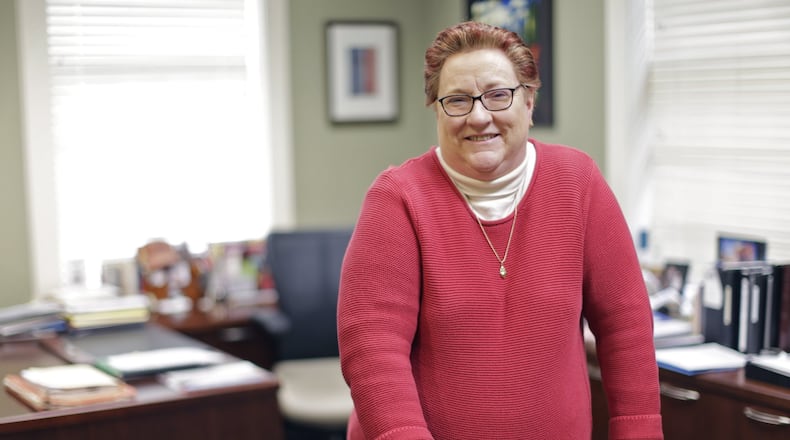When Peggy Merriss was named interim Decatur city manager in February 1993, her predecessor Curtis Branscombe said, “If you want somebody to run the city, you got the right one. ‘Cause she will run it.”
In a quiet defiance of odds, Merriss has spent 24 years doing just that. The average U.S. city manager tenure is 5 to 7 years, and only 15 percent of city managers are women. Merriss, who was the first woman president of the International City/County Management Association, is Decatur’s only female city manager since the city adopted the council management model in 1924.
No one has held the job longer. She has presided over Decatur’s ripening from a small Southern burg frozen in the 1950s into a thriving township with a nationally known book festival, close to 100 restaurants and thousands of people living downtown.
As Branscombe foretold, she does “run it.” Last fall, for example, two police officers lost their jobs after failing to report a missing $7. Police Chief Mike Booker, who’s been chief nearly as long as Merriss has been city manager, fired one and accepted the other’s resignation. A third party reviewer also recommended releasing both officers.
After several days thinking and reading reports, Merriss overruled both.
While the officers’ errors were significant, she said, “I’m looking at it from a community standpoint, and what is appropriate and what is fair.”
That “community standpoint” describes her management style. “When you look at cities that are successful,” Merriss said, “there has to be a unified vision, not only among the staff, but among the elective leadership. You have to determine strategies, build a plan and you can’t stand still. You’ve always got to be asking what’s the next opportunity.”
Decatur's next opportunity may be the land just outside the city limits the United Methodist Children's Home has decided to sell. The city has coveted the 77 acres of mostly green space for decades, envisioning among other things a large recreation space for multiple uses.
Merriss says that at this stage she’s “uncomfortable” talking about the UMCH tract. But there’s little doubt that purchasing the property and whatever development follows would be a significant chapter in city history and her career.
“I came here at the right time,” Merriss said during a recent interview. “They had already set the trajectory for where the city wanted to go with the Town Center Plan,” a 46-page document that, “was largely created through community planning. That,” she said, “set the standard for how we continue planning to this day — with a series of community groups rather than a small group of people going off someplace and writing a plan.”
Credit: Bob Andres
Credit: Bob Andres
She was originally hired as an employment service officer in August 1983, a couple of weeks after her 22nd birthday. Merriss subsequently served a 10-year apprenticeship delving into every aspect of city management. She wrote job descriptions, wrote copy for job vacancy ads, managed employee recruitment, interviewed candidates, negotiated salary packages and conducted employee orientation.
Merriss had missed the 1974-78 construction of the MARTA tunnel, featuring an open trench down Sycamore Street and through downtown. But the aftershock remained in 1983, with city morale at low ebb and many of the square’s turn-of-the century buildings eroding or boarded up. Decatur’s population had declined nearly 25 percent since 1970.
Merriss is fond of saying, “nothing in a democracy happens fast.”
The 1982 town plan outlined how the city could lure visitors through festivals and special events. But it wasn’t until 1987 that the first occurred, the “Decatur Beach Party,” featuring a couple of pickup trucks dumping sand on the MARTA plaza and a DJ obsessed with Kool & the Gang’s “Celebration.” It took another 19 years for the AJC Decatur Book Festival, which now draws close to 80,000 yearly, to debut. It wasn’t until 1997, or 15 years after the town plan, before ground was broken for the first downtown residential mixed-use development.
Merriss has overseen community-driven strategic plans in 2000 and 2010, both extensions and updates of the 1982 iteration. The 2000 edition led to a community transportation plan, which evolved into a study on the negative health impact of automobiles.
This has become a passion of hers, and for several years the city has been narrowing roads, adding bike lanes and widening sidewalks. Last December commissioners approved a master plan that will ultimately construct seven separate bike paths and trails totaling nine miles. It’s anticipated the work could take at least 10 years.
That’s typical of the city’s commitment, under Merris’ leadership, to the long game.
About the Author
Keep Reading
The Latest
Featured




